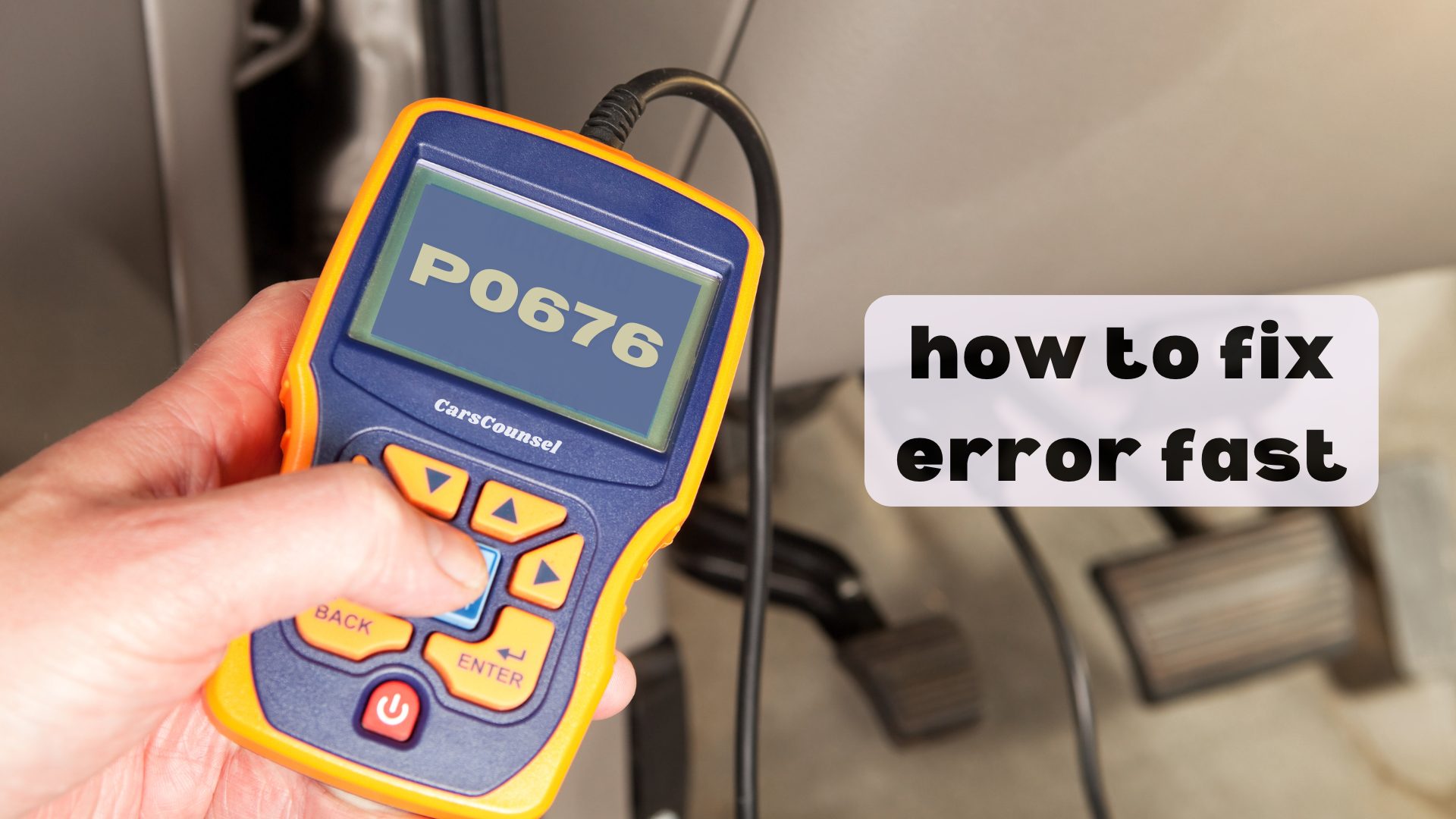Did you know that almost 20% of diesel engine problems come from bad glow plugs? If you have a P0676 code, you need to fix it quickly to prevent worse engine issues.
First, use an OBD-II scan tool to confirm the error code and check the glow plug in cylinder 6 for any visible damage.
Testing its resistance with a multimeter can help find the problem, but don’t stop there. You also need to check the wiring and connectors.
To make sure you fix it completely, you’ll need to take a few more steps.

Quick Navigation
Key Takeaways
- Use a code reader to confirm the P0676 error.
- Check and replace the bad glow plug in cylinder 6.
- Look for and fix any damaged wires or connectors.
- Make sure the glow plugs are getting the right voltage.
Understanding the P0676 Code
The P0676 code means there’s a problem with the glow plug circuit for cylinder 6 in diesel engines, which is important for starting the engine in cold weather and for overall engine performance.
To fix this, start by using an OBD-II scan tool to read the code. Then, test each glow plug one by one with a multimeter.
Check the wiring for any damage or rust. Make sure the voltage in the glow plug circuit is correct. For a more detailed check, use an oscilloscope to look at the voltage pattern.
Also, visually inspect for any bad connections. Following these steps quickly will help keep your diesel engine running well and avoid further issues.
Importance of Glow Plugs
Glow plugs are crucial for ensuring your diesel engine starts easily, especially in cold weather. They warm up the air in the combustion chamber to make ignition more efficient.
There are two main types: metal and ceramic, each with its own performance traits. Keeping your glow plugs in good shape is key for your engine’s best performance.
Here’s what to do:
- Regularly check glow plugs for any signs of wear or damage.
- Use a multimeter to test each glow plug and make sure they’re working properly.
- Replace any bad glow plugs right away to avoid starting problems and engine misfires.
Taking care of your glow plugs helps your engine start reliably and last longer. Ignoring them can cause serious engine issues, so regular maintenance is important.
Symptoms of P0676 Code
When your vehicle’s diagnostics detect a P0676 code, you’ll notice issues like hard starting, rough idling, and lower fuel efficiency. These problems happen because a bad glow plug in cylinder 6 messes up the diesel engine’s performance.
To keep your glow plugs in good shape, watch out for:
- Slow Starting: Your engine takes longer to start, especially when it’s cold.
- Engine Misfires: The engine might misfire, causing it to idle roughly.
Fixing the P0676 code quickly is important to keep your diesel engine running well.
Regularly check and maintain your glow plugs to prevent these problems and ensure your engine runs smoothly.
Common Causes of P0676
Common Causes of P0676
If you encounter a P0676 code, it might be due to a problem with the glow plug in cylinder 6, which could make it hard to start the engine and cause it to misfire. Issues with the wiring, such as corrosion or damage, can interrupt the power supply to the glow plugs. A faulty glow plug control module might stop power from reaching the glow plugs, while electrical short circuits can cause sporadic issues. Poor connections, like loose or corroded connectors, can lead to inconsistent performance.
| Cause | Description | Solution |
|---|---|---|
| Bad Glow Plug | Problem with the glow plug in cylinder 6 | Replace the glow plug |
| Wiring Problems | Corroded or damaged wiring | Fix or replace the wiring |
| Bad Control Module | Faulty glow plug control module | Replace the control module |
| Short Circuits | Sporadic issues due to short circuits | Check the electrical system |
| Poor Connections | Loose or corroded connectors | Clean and tighten the connections |
Regular maintenance of your glow plugs and thorough electrical checks are essential.
Faulty Glow Plug Issues
Fixing faulty glow plug problems is crucial for solving the P0676 code because a bad glow plug in cylinder 6 can make starting the engine hard and cause it to misfire.
To fix this, start by testing the glow plug to see if it’s working right. Use a multimeter to check the resistance:
- Normal Resistance: Should be between 0.5 to 2 ohms. Anything outside this range means the glow plug is bad.
- Voltage Check: Make sure the glow plug gets the right voltage when you turn on the ignition.
Regularly checking and replacing glow plugs when needed can prevent future problems. These steps help ensure your engine starts easily and runs well.
Diagnosing P0676 Code
To diagnose the P0676 code, start by using an OBD-II scan tool to read the fault code. Confirm that the P0676 code is present, indicating a problem with the glow plug in cylinder 6.
Next, use a multimeter to check the resistance of each glow plug, making sure they match the manufacturer’s specifications.
Then, use the multimeter to check for consistent voltage in the glow plug circuit. Look for any signs of corrosion or damage in the wiring and connectors.
Finally, use an oscilloscope to check the voltage waveform for any irregularities that might point to an intermittent issue.
This step-by-step approach ensures an accurate diagnosis.
Fixing P0676 Code
Replacing the faulty glow plug is usually the first step in fixing the P0676 code, which helps ensure the engine starts smoothly and prevents misfires. Here’s how you can do it:
- Remove the old glow plug: Disconnect the battery, find cylinder 6, and carefully take out the faulty glow plug.
- Install the new glow plug: Make sure you have the right type for your engine, then install it and tighten it according to the manufacturer’s guidelines.
Taking care of your glow plugs is important for maintaining a diesel engine.
After you replace the glow plug, clear the code with an OBD-II scanner and take the car for a test drive to make sure it’s fixed.
Regular maintenance keeps your engine running well for a long time.
Affected Car Models
When dealing with the P0676 code, you’ll notice that certain car models like the Chevrolet Silverado, Ford F-250 Super Duty, and Jeep Grand Cherokee often have issues with their glow plug circuits.
These diesel vehicles typically run into problems because of bad glow plugs, failed control modules, or wiring issues.
Specifically, the Chevrolet Silverado with a 3.0-liter Duramax engine and the Ford F-250 with a Powerstroke engine are known for these issues.
The Jeep Grand Cherokee often has problems with faulty glow plug control modules, which can trigger P0676 errors.
Other diesel models with six or eight-cylinder engines can also face similar issues.
Identifying and fixing the problem quickly in these vehicles ensures you keep your engine running smoothly and avoid bigger issues.
Professional Assistance
If you’re not sure how to diagnose or fix the P0676 code, it’s best to get help from a qualified mechanic. They can make sure the problem is fixed correctly and quickly. Mechanics use specialized tools to find out exactly what’s wrong.
- Thorough Checks: They use tools like OBD-II scanners, multimeters, and oscilloscopes to test everything.
- Correct Repairs: They can replace bad glow plugs, fix wiring, or repair the glow plug control module.
Preventing Future Issues
To prevent future P0676 code issues, it’s important to regularly check and maintain your glow plug system.
Start by scheduling routine inspections of your vehicle’s glow plugs. Look for any signs of wear, corrosion, or damage in the wiring. Make sure all connectors are tight and free from rust.
Use a multimeter to check the resistance and voltage in the glow plug circuit so you can spot any problems early. Regularly check the glow plug control module to ensure it’s providing consistent power.
By sticking to a regular maintenance schedule, you can reduce the chances of running into P0676 code problems.
Keep detailed records of all your inspections and repairs to track any patterns and improve your vehicle’s reliability.
More OBD-II Codes
Frequently Asked Questions
Can DIY Fixes Void My Vehicle’s Warranty?
Fixing your car yourself can affect your warranty. If you do repairs on your own, you might void the warranty. It’s a good idea to read the warranty terms and think about getting a professional to do the work to keep your coverage intact.
What Tools Do I Need for Diagnosing the P0676 Code?
Let’s get straight to it. You need a diagnostic scanner to read the code and glow plug testers to check each plug. Use a multimeter to check voltage and look over the wiring for any damage or corrosion.
How Long Does It Take to Fix the P0676 Code?
Fixing the P0676 code usually takes about 1-2 hours. You’ll need to check for glow plug problems, use a multimeter to test parts, and replace any faulty ones. Make sure to clear the code and take the car for a test drive after.
Are Aftermarket Glow Plugs Reliable Compared to OEM Parts?
When it comes to reliability, aftermarket glow plugs can be hit or miss. OEM glow plugs usually perform better, giving you consistent heat and lasting longer. If you want your engine to run smoothly, it’s best to stick with OEM parts.
What Are the Potential Costs Involved in Diagnosing the P0676 Code?
You’ll need to pay diagnostic fees between $50 and $100. After that, you might have to cover the cost of fixing or replacing glow plugs ($50–$150), repairing wiring, or replacing the control module ($100–$300). Make sure to clear the code and take the car for a test drive afterward.
Conclusion
You’ve dealt with the P0676 code, showing once again that you know your way around cars.
You’ve used your OBD-II scan tool, checked the glow plug’s resistance, and maybe even fixed some wiring.
Clear the code, take a test drive, and enjoy the satisfaction of a job well done.
Remember, cars always have a way of needing more attention. Great job!

